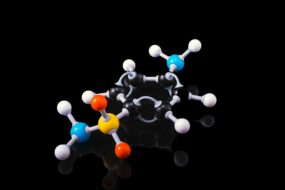
Thiopentone sodium is an ultrashort-acting thiobarbiturate. It is highly soluble in water yielding a very alkaline solution, which should be prepared freshly before injection. Extravasation of the solution or inadvertent intra-arterial injection produces intense pain, necrosis, and gangrene.
Mechanism of action.
- Acts by potentiating action of inhibitory GABA receptors.
- Depress the action of the excitatory neural transmitter in the CNS.
Clinical uses
- Induction of general anesthesia.
- Short-term control of seizures.
- Cerebral protection in focal cerebral ischemia reduces cerebral metabolic rate and blood flow.
- Alone use in short surgical procedures.
Adverse effects
- Hypotension,
- Myocardial depression
- Irregular heartbeat.
- Severe pain at the injection site.
- Bradycardia
- Extravasation that causes necrosis.
- Laryngospasm occurs when respiratory secretions or other irritants are present or when intubation is attempted while anesthesia is light.
- Cardiovascular collapse if hypovolemic.
- Shock or sepsis
Drug interactions.
Thiopentone Sodium is physically incompatible with:
- Atracurium
- Vecuronium
- Suxamethonium.
Forms precipitates.
Succinylcholine and thiopentone react chemically and should not be mixed in the same syringe.
Contraindication.
- Acute intermittent porphyria.
- By per sensitivity to barbiturates.
Dosages.
- Injected IV (3–5 mg/kg) as a 2.5% solution. The drug produces unconsciousness in 15–20 sec.
- PENTOTHAL, INTERVAL SODIUM 0.5, 1 g powder for making fresh injectable.












